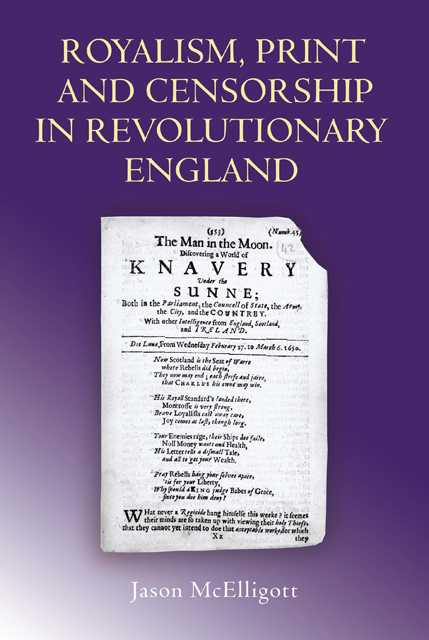Book contents
- Frontmatter
- Contents
- Illustrations
- Acknowledgements
- Abbreviations
- Introduction: Royalism and its Problems
- 1 Royalists and Polemic in the 1640s
- 2 The Politics of Sexual Libel
- 3 The Twists and Turns of Royalist Propaganda
- 4 Authors, Shifting Allegiances and the Nature of Royalism
- 5 Printers, Publishers and the Royalist Underground
- 6 Hunting the Royalist Press
- 7 The Theory and Practice of Censorship
- 8 A New Model of Press Censorship
- Conclusion
- Select Bibliography
- Index
3 - The Twists and Turns of Royalist Propaganda
Published online by Cambridge University Press: 10 March 2023
- Frontmatter
- Contents
- Illustrations
- Acknowledgements
- Abbreviations
- Introduction: Royalism and its Problems
- 1 Royalists and Polemic in the 1640s
- 2 The Politics of Sexual Libel
- 3 The Twists and Turns of Royalist Propaganda
- 4 Authors, Shifting Allegiances and the Nature of Royalism
- 5 Printers, Publishers and the Royalist Underground
- 6 Hunting the Royalist Press
- 7 The Theory and Practice of Censorship
- 8 A New Model of Press Censorship
- Conclusion
- Select Bibliography
- Index
Summary
Strategy and tactics
The aim of the royalist newsbooks was very simple: to assist in the successful restoration of Charles I (and after the regicide, Charles II) on the best possible terms for the Stuarts. Yet if the aims of the newsbooks were simple, the short-term tactical manoeuvres forced upon them by the twists and turns of royal policy were remarkably convoluted and intricate. Some of the ‘aboutturns’ forced upon the Stuart kings were so quick and sharp that they must have disorientated and demoralized many royalists. There was always a danger that winning the new allies necessary to deliver a royal victory would involve the adoption of policies and actions which would alienate the faithful. The men who wrote and printed the newsbooks must, like very many of their readers, have been taken aback by the sudden, seismic shifts in royal policy during these years. Yet it was the task of these men to argue for, explain, or explain away, the changes and contradictions of royal policy. The newsbooks of these years evidently hoped to keep the loyalists on-side as well as appealing to the king's potential new allies. It was the authors’ misfortune that they implicitly agreed in advance to defend every decision of the king and his ministers without having any idea what those decisions might be. Neither did they have any prospect of influencing the decisions of the king and his ministers. Yet, as we shall see, whatever their personal misgivings or beliefs, the men behind the royalist newsbooks followed the twists and turns of royal policy with a surprising degree of skill and dogged determination. They were, quite simply, willing and able to propagandize in favour of any new royal policy or alliance, no matter how inconsistent with their previous arguments it seemed to be.
It would be possible to look at any number of tactical shifts made by the royalists between 1647 and 1650. One might, for example, describe how, during the summer of 1648, they temporarily laid aside their deep-seated antipathy to the Presbyterians who controlled the City of London. It was a commonplace in the newsbooks that the City and the men who controlled it had been ‘the Nursery of the late Warre, and the main cause of the Kingdomes present miseries’.
- Type
- Chapter
- Information
- Royalism, Print and Censorship in Revolutionary England , pp. 63 - 92Publisher: Boydell & BrewerPrint publication year: 2007



